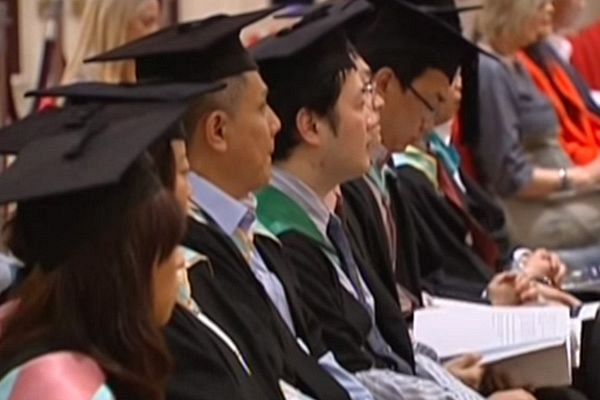Higher education institutions across Australia were warned of an impending crisis — heavy reliance on the Chinese international student market was a massive financial risk they took, knowing they were "too big to fail".
With the coronavirus epidemic and the ensuing travel banks expected to slice off $2.81 billion from their balance sheets, has a lesson been learnt?
ONE OF THE KEY AREAS in Australia and China’s bilateral relationship affected by the spread of the coronavirus (COVID-19) is the Australian services export sector — particularly higher education. In comparison to commodities such as iron ore, minerals and wheat, a smaller proportion of Australian services such as higher education are exported to China. Experts warn that the latter are more likely to suffer higher losses under the current ongoing coronavirus epidemic.
This is simply because of the heavy reliance of the higher education sector on international students, a majority of whom come from China. In the last decade, the sector which comprises of universities, vocational training institutes/TAFEs and ELICOS institutions, has become increasingly dependent on full-fee paying international students as a source of revenue.
How valuable is the international education sector to the economy?
There is little doubt that the international higher education export sector, overall, has emerged as a major contributor to the national economy. To give you an example, between 2008 and 2018, as per Universities Australia, the value of international education exports rose by an astounding 83.33%. In 2018, international education contributed more than $33 billion to the national economy, one-third of which came from China. In terms of state economies, in Victoria alone, in 2018, the international education sector was valued at $10.6 billion.

How valuable is China to the sector?
China has consistently been the top source country across the sector. In 2019, for instance, Chinese nationals accounted for 37.3% of all new enrolments in universities, 37.5% of new enrolments in the non-award sub-sector and 26.9% of enrolments in ELICOS institutions. Contrary to popular belief, even the most prestigious academic institutions, included in the elite Group of Eight, also derive a bulk of their income directly from Chinese students. According to recent estimates, 22.7% of the University of Sydney’s revenue, for instance, comes from Chinese students’ fees. Similarly, 16.4% of the revenue earned by the University of Melbourne is sourced from China.
Likely impact of coronavirus on the sector
In the wake of the coronavirus outbreak, the Government’s travel bans to and from China, which came into effect from 1 February, are likely to impact not the management or senior academics and researchers at these universities, but the teachers, lecturers and tutors directly involved in imparting education. Many of them are already employed on a casual basis and have very little job security. A vast majority of their students are Chinese international students, be it in the Arts, Commerce or Science. So, what happens when thousands of students are stranded and not able to attend classes?
Just like any other business, when customers are not there, cost-cutting takes place.
While some universities have taken the humane route of delaying their teaching semester or offering students the option to study online (which comes with its own unique challenges such as having to adapt all teaching materials for online delivery), many of them will be protecting their bottom line by straining casual teaching staff and cutting the number of hours they can work.
The University of Queensland has already informed several of their teaching staff that they will be losing 17 weeks of work, for instance. Of the university’s overall revenue, 14% comes from Chinese students’ fees.
Universities were warned
Interestingly, nearly six months ago, the higher education sector, particularly universities, were warned of an impending crisis emanating from their over-reliance on Chinese students’ fees. In August 2019, in a widely discussed report by University of Sydney sociologist Dr Salvatore Babones and the Centre for Independent Studies, several big Australian universities were cautioned of the massive financial risk they were taking in putting all their eggs into one basket and relying heavily on the precarious income from the Chinese international student market.
The universities were described as being "too big to fail" and if something was to go wrong the Government would step in to bail them out. This description in itself is reminiscent of the way in which the big banks were described prior to the Global Financial Crisis of 2008.
Controlling the damage
It comes as no surprise then that the Victorian Government has been taking steps to control the damage. On Friday 21 February, several key sites in Melbourne were lit in the colour of the Chinese flag as a mark of solidarity between Australia and China. Despite partisan criticism, the Government will send a trade delegation of 100 Victorian businesses to China, as soon as it is safe to travel there. It also plans to make good on the Belt and Road Initiative in which two Chinese firms are part of bids for the $16 billion North-East link. Seemingly this should, in theory, cover off the estimated $2.81 billion that is expected to be sliced off from the higher education export sector during the coronavirus epidemic.
However, beyond the money and trade deals, this incident and the upheaval it caused is a potent reminder of the financial risk that universities have been taking and the need to reinstate a sense of balance and equity in higher education remembering the purpose of education more than the business model.
Prashant Bhatia is a writer, researcher, interviewer and speaker who is currently in his final semester of a Masters in Global Media and Communications at the University of Melbourne. You can follow him on Twitter @mrprashant_b.
 This work is licensed under a Creative Commons Attribution-NonCommercial-NoDerivs 3.0 Australia License
This work is licensed under a Creative Commons Attribution-NonCommercial-NoDerivs 3.0 Australia License
Support independent journalism Subscribe to IA.












